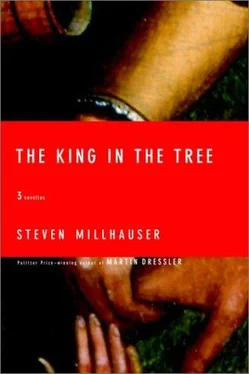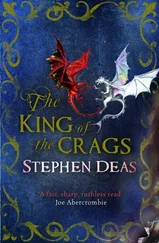Really, they go too far. Have they no sense? No shame? The King has been absent for two days. He announced that he would spend two nights in one of his hunting lodges and not return until the third day; in the presence of his Council he placed the Queen in Tristan’s care. All day they walk like lovers, seeking out secluded places. A servant saw the Queen and Tristan emerge at dawn from the door at the base of her tower that leads into the garden. At dinner they sit side by side at the royal board; he permits his hand to graze her hand while her throat flushes above the gold brooch clasping the lappets of her brilliant green mantle. Fearing the King’s wrath, everyone turns away, remains unwatchful and ill at ease. Oswin stares at them coldly. One can almost hear, from the high prison of the south-east tower, the rattle of Modor’s chains.
A trap! Was it a trap? In the middle of the night I was wakened by the King’s hand on my shoulder and the light of a candle glaring on his cheek. He had returned alone, secretly, in the night. My door remains always unbarred, so that the King may find me when sleep eludes him. In his hunting lodge he had dreamed that Ysolt had been gored in the side by a wild boar. I rose quickly from my bed, groped for my tunic and sword belt in the flickering dark, and followed the King to the royal bedchamber. Slowly he pulled aside the curtain, which rattled on its rings. He thrust in the candle. The bed was empty.
The King motioned me to follow him. We climbed the winding stairs to the women’s quarters; the guard admitted us into a large hall with curtained bench-beds along the walls, where the Queen’s companions sleep. Here and there on the rush-strewn floor, servant women lay on quilts beneath bed-covers. A small adjoining chamber served as the Queen’s private quarters. The room with its bed and clothes chest was empty.
We descended to the courtyard, crossed to the northwest tower, and climbed the winding stairs to the Queen’s high chamber. With a large iron key the King unlocked the door. Dark bedposts topped by gilt wooden swans glowed in the moonlight; the bed curtains were open. On the coverlet lay a silk girdle brocaded with gold. We descended the dark stairs to the ground floor — a storage chamber with locked chests— where a narrow door admitted us into the Queen’s garden. Under the summer moon we walked along the sanded paths of the garden; a shimmering peacock moved before us and disappeared. The King stepped behind a tree, peered into wall recesses supplied with turf seats, turned suddenly at the sound of a rat. At an arched opening in a hedge he drew his sword and led me into a maze of hedgerows, which brought us to a grove of fruit trees. Nothing stirred in the moonlight.
We returned through the garden and made our way across the courtyard to the castle keep. On the broad steps leading up to the great hall we passed a sleeping black hen. Through an arch I followed the King up the winding stairs. I had thought we were returning to my chamber, but the King stopped before Tristan’s door. With another iron key he entered.
The curtains of Tristan’s bed were closed. At the top of the bedposts sat carved falcons with gilt beaks and wings. The King, holding his candle and beckoning me to follow, approached the bed and slowly drew aside the curtain.
The Queen lay in the bed, alone and fast asleep. The covers were partly thrown back; she was fully dressed, and wore a head covering, held in place by a gold fillet set with emeralds and jacinths. In the light of the candle I saw the King’s uncertain, sorrowing eyes.
“My lord,” said Tristan, standing behind us. The King, turning quickly, splashed candle-wax on his hand.
“I hope your hunt was successful,” Tristan said, sheathing his sword. He was fully dressed, in green tunic and crimson surcoat; in the flamelight a network of tiny pearls glittered on his mantle, one end of which was thrown over his right shoulder. He nodded at the bed. “The Queen was frightened — a rat in the dark. I have guarded her with my life.”
“Indeed you have,” the King replied. “But as for me, the wild boar escaped. A long day — I’m tired now. Come, Thomas.”
“Shall I wake the Queen?” Tristan asked.
“By no means,” replied the King. “But when she wakes, please tell her that her husband bids her good morning.”
I made my way with the King to his chamber, where I wished him good night before returning to my bed.
A new feeling is in the air. The lovers, no doubt alarmed by the King’s nocturnal visit, have become uncommonly circumspect, while the King, abandoning the strategy of frivolous jollity, watches them with visible suspicion. He continually sends for the Queen on trivial pretexts: asks her if she is satisfied with her attendants and servants, inquires after her health, requests her to play the rote or harp for him. The Queen is resolutely obliging, but it is clear that she finds his attentions wearisome. Tristan spends long hours following his hawks. Once, when the Queen was playing a melancholy song on her harp, the King suddenly ordered her to stop and began pacing restlessly. “Continue to play for Thomas,” he said irritably, and strode from the chamber. For a moment the Queen raised her eyes and glanced at me, before taking up the harp again. We both understood that the King had suspected her of dreaming of Tristan, as she played her mournful song.
It is not good to pity one’s King.
When I try to imagine Queen Ysolt, I see only an enigma, a contradiction. In all her dealings at court, she is honorable, forthright, and entirely trustworthy; and yet, whenever it is a question of Tristan, she does not hesitate to lie. Although she is frank by nature, she conceals a treacherous secret; although she is obedient by habit, her obedience surrounds and conceals a fierce, unwavering disobedience. One is tempted to think that she is loyal in all things pertaining to Tristan, and disloyal in all things pertaining to the King, but such a formulation provides I think far too easy and shallow a way of grasping her: for although she is loyal to Tristan, she is also loyal to the King, and although she is disloyal to the King, she is also disloyal to Tristan. She is loyal to the King because night after night she lies naked with him in the royal bed, night after night the sounds of lusty lovemaking come from the King’s bedchamber. It is possible, of course, that at such moments she is thinking of Tristan. But who can imagine that, even as she longs for Tristan, she is entirely forgetful of the King?
I have said that although she is disloyal to the King, she is also disloyal to Tristan. For if, when she is with the King, she is haunted by Tristan, is it not also true that when she is with Tristan, she is haunted by the King? To be Tristan’s lover is to betray the King; the act of love is an act of disobedience. But disobedience, by its very nature, includes an awareness of the one who is disobeyed. The Queen can never be alone with Tristan; even as she lies in Tristan’s arms she will see, rising before her, the King’s troubled face, she will feel, falling across her, the shadow of the King.
Sometimes, when I watch the Queen unobserved, the calmness of her pale, smooth face and heavy-lidded eyes takes me by surprise. Then I notice a slight tensing between the eyebrows; the beautiful dawn-gray eyes stare unseeing; and, like someone for whom the outside world has fallen away, she raises a slender hand to her forehead, as if to wipe away a loose hair.
Is it possible? Even now I scarcely believe the news. Just when an uneasy harmony has been restored, just when caution and propriety have become the order of the day, the King has taken the very step that many felt he should have taken during his period of false heartiness. He has banished Tristan. More precisely: he has forbidden Tristan to pass the bounds of the castle wall, or to enter the orchard or the forest.
Читать дальше












